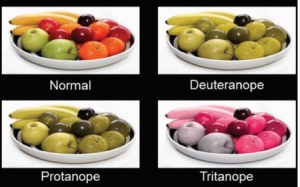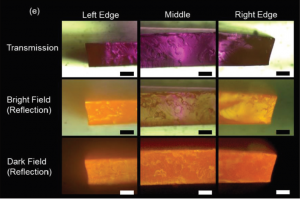Color vision relies on blue, green and red color receptors acting in close collaboration with each other. When the brain processes a color, it is dependent on the fine calibration of activation thresholds for each type of receptor. If one of these receptor types is missing or defective, then color perception can become severely limited.

Color perception varies with different forms of color blindness
While there is no cure for color blindness, specialized glasses can improve perception by filtering out wavelengths that cause trouble in color differentiation. These glasses are certainly useful aids, but they are often bulky, expensive, and can be incompatible with other vision corrective lenses. In order to increase the range of options open to sufferers, a team from the UK has designed color filtering contact lenses.
A wide range of fabrication parameters were examined in the study. The lenses were colored by both dipping them into a dye, or dropping a dye onto the lens. The compatibility of two different commercially available lenses with the fabrication process was established, and the effect of dye concentration and dip time on the hue of the finished product was also determined.

Transmission spectra of dyed lenses
To model the behavior of the lenses in the eye, they were closely monitored while covered by an aqueous solution. Some diffusion of the dye into the solvent was observed over extended times, indicating that further work is required to improve the immobilization of the dye in the lenses.
A preliminary study was carried out to determine whether the dyed lenses improved the ability of people with red/green color blindness to perceive color. While the results of the study were mixed, some of the individuals reported an improvement in color perception, suggesting that further studies on this new visual aid are certainly warranted.

















